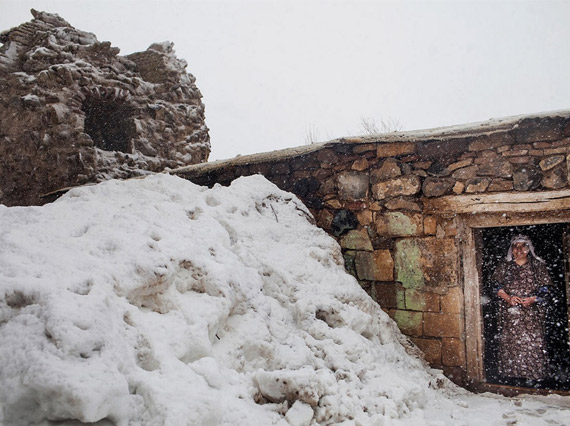Memory transferred through the voices of the Armenians of Sasun

PhD student of the Department of Anthropology at Laden University of Holland Wendy Hamlink, who is writing a dissertation on Kurdish national poets (dengbezhs), says music helps Islamized Armenians establish a connection with their past and the identity with which they feel associated.
In her speech at the conference devoted to Islamized Armenians, Hamlink first touched upon the topic of “Armenianness” in Kurdish poetry and later referred to the famous “Metran Isa” destan and shared the story of the daughter of a clergyman living in Van, Mariam, whom the val of Van married, but Mariam was in love with a young Kurd. Hamlink mentioned that the Armenians are also remembered in the songs that Armenian dengbezhs Karapet Khacho and Gule performed in Kurdish, but these musicians weren’t the bearers of Armenian culture, but Kurdish culture.
Providing information about the population of Sasun prior to and after 1915, which was under Ottoman dominance in the 16th century, but was composed of Armenian villages until the late 19th century and had remained as mostly an independent federation, the researcher mentioned that though most of the survivors of the Armenian Genocide became Islamized, they kept their Christian faith and maintained their rituals for a long time.
Hamlink stressed the fact that prior to 1915, people would speak in Armenian, Arabic and Kurdish in the region, several Kurds and Armenians knew each other’s languages, but after 1915, the Armenian language and culture were almost completely eliminated in the course of one generation. Hamlink mentioned that there was only one Armenian dengbezh left in the region, Amo, who used to perform Armenian songs, but converted to Islam after 1915, became Omer and only performed Kurdish songs. The researcher began her speech by citing an Armenian of Sasun who said “we keep hearing Kurdish music”, which shows the reality.
The story of a Kurdish, Armenian-Arab dengbezh
Bringing up the biography of a Kurdish dengbezh as an example, Hamlink mentioned that the Armenian identity has been eliminated on the one hand and hasn’t been forgotten on the other. Unlikek many Armenians of Sasun, Dengbezh Jihan, who isn’t ashamed of saying that his father was Armenian and that he also takes pride in being a Muslim with roots tracing back to Christianity, presents himself not as a “fle”, but a Kurd, a Muslim (misilmin, meaning Islamized Armenian). Dengbezh Jihan was born into the family of Hakob, his Armenian father and survivor of the Armenian Genocide, and his Arab mother in 1925 in Hevre village. At the age of 6, Jihan’s mother left his father and got married to another man. When the father passed away after a while, Jihan grew up with his aunt who had gotten married to a Kurd. At the age of 20, at the invitation of one of his friends, Hamo Agha (his mother was Armenian and father was Kurdish), he left for Hamo Agha’s village to work with him. After a while, he got married to Hamo Agha’s daughter and learned how to be a dengbezh from the dengbezhs that would come and go.
Talking about the relations between Islamized Armenians who had become Kurds and the Christians in her speech, Hamlink shared the story that dengbezh Jihan had shared about a woman dengbezh who had been forcefully Islamized and later had returned to Christianity. Dengbezh Jihan talked with admiration about the mastery of the only Armenian woman dengbezh that she had seen in her life. Her name was Kheme (Muslim name Henife).
Hamlink said dengbezh Jihan has 9 children and has been living in Istanbul since 2004. All of dengbezh Jihan’s children are active members of the Kurdish movement. Dengbezh Jihan has always spoken in Kurdish with his children, and the youngest of the children is a lawyer in Istanbul and is rediscovering his roots, that is, the Armenianness. He has taken an Armenian name and is very closely following the actions of the Kurdish and Armenian movements. No matter how much his father, dengbezh Jihan says “I am a Kurd and a Muslim, I am not fle”, dengbezh Jihan’s child shares his personal “Armenian” story.
Hamlink ended her speech with the following thought: Turkey is systematically trying to erase the Armenian identity, but in response to all this, the “voice” of the Armenians continues to resonate, just like it resonates in the words of a Kurdish dengbezh.
Altug Yilmaz
www.agos.com.tr
Translation from Turkish to Armenian by Anahit Kartashian
akunq.net




 Արևելահայերեն
Արևելահայերեն Արևմտահայերեն
Արևմտահայերեն Русский
Русский






